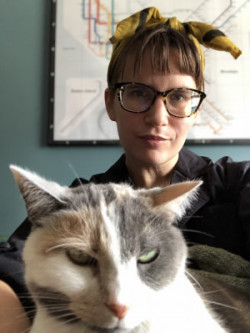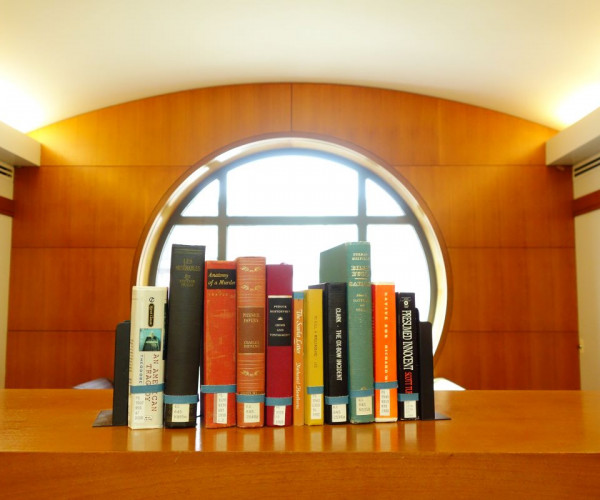Genevieve Tung and Biddle Law Library pave innovative path for the future of legal research education
In March 2020, the COVID-19 pandemic forced an instantaneous pivot to virtual learning at the University of Pennsylvania Carey Law School, and Biddle Law Library was at the forefront of coordinating efforts to make the transition to remote as seamless as possible.
 Genevieve TungBiddle Library staff worked tirelessly in the early days of the pandemic to quickly digitize study resources and thousands of pages of course materials to ensure students had the necessary resources to complete any coursework remotely. Genevieve Tung, who started her role as the Associate Director for Educational Programs at Biddle Law Library in January 2020, had only worked on campus for two months before being thrust into spearheading a dramatic shift in the way Biddle supports students, faculty, and staff in a world in which the library was not accessible as a physical space. But this shift hasn’t interfered with her longer-term goals, she said.
Genevieve TungBiddle Library staff worked tirelessly in the early days of the pandemic to quickly digitize study resources and thousands of pages of course materials to ensure students had the necessary resources to complete any coursework remotely. Genevieve Tung, who started her role as the Associate Director for Educational Programs at Biddle Law Library in January 2020, had only worked on campus for two months before being thrust into spearheading a dramatic shift in the way Biddle supports students, faculty, and staff in a world in which the library was not accessible as a physical space. But this shift hasn’t interfered with her longer-term goals, she said.
“What we’ve done [during the pandemic] is not that different from what I had originally envisioned,” Tung said. “My goal was to coordinate all of our instructional work – to sort of get my arms around everything we were doing and figure out where there were gaps and where we could extend ourselves in new ways and how we might trim back things that were not working as well – to make it a more manageable, and enjoyable, educational process. And moving to all-remote teaching has not interfered with that goal.”
Tung’s role with Biddle is focused, in part, on instructing legal research. The North Carolina native, who came to the Law School after serving as the Associate Director of Rutgers Law Library, is teaching an introduction to legal research class for the Master in Law program as well as courses for JDs and in the LLM program, while also reimagining how teaching fits in with all of the other services that a modern law library should provide.
And that is not just in terms of how the library supports student research, but faculty work as well, while also still remaining accessible to the public as a vital resource. It is a position that requires a lot of coordination between departments as well as internally – the kind of constant motion that might usually be derailed by a remote environment.
“Since her arrival in January, Genevieve has completely revamped the legal research curriculum for the Law School, ensuring that our students have a cutting-edge practical research education,” says Amanda Runyon, Associate Dean and Director of the Biddle Law Library. “It’s a big focus of ours. She took a holistic approach to modernizing and transforming our entire system of legal research education at the Law School.”
Tung says that the massive team effort to adjust the library’s services, while stressful in the midst of a pandemic, aligned with the idea of rethinking everything about the library. In other words, when the need to rethink everything arises and a natural catalyst forces a quick change, big transitions that may normally take longer to implement become not only necessary but also attainable.
“It does make it a little more difficult to evaluate how we’re doing – just because there are so many different variables in play,” says Tung. “But on the whole it’s added layers of complexity, but it hasn’t changed the overall goal – which is to meet students where their needs are, to anticipate the direction the Law School would like us to help develop their skills, for example, in things like transactional research, and so we haven’t missed a step in that direction.”
In the last year, Biddle has expanded the number of courses they offer in specialized legal research, effectively doubling the research course offerings for JDs, while also partnering with Legal Practice Skills (LPS) to not only move critical first-year curriculum online, but also innovate it in a way that improves the overall offering.
Tung explains that moving Biddle’s research component of the LPS curriculum online was a heavy logistical lift, but it also forced the issue of figuring out how to offer the research component in an a remote format. What resulted was a more flexible, “choose your own adventure” approach to coursework, allowing students to focus on resources for transactional practices or resources for litigation through asynchronous videos and assessments they could access and complete independently.
Carrying forth that approach and building upon it for a fall semester of hybrid learning to make the experience as accessible as possible allowed Tung to consider how to smoothly integrate other logistics like creating a syllabus, the logical flow of working on and off campus, creating personal connection with onsite and remote students, and the other various moving parts.
“As long as the students like it, we’re happy,” she said. “And it gives us new options for thinking about how we can help fit research into moving forward, because the LPS class is just so important and covers so many crucial skills. We don’t want research to get lost in that, but we want it to be as relevant and timely and helpful as possible in moving them towards their goals. So being open to the technological options we may have is a positive development for us going forward.”
Another positive to remote learning and leveraging new technologies is the ability to quickly shift gears when something isn’t working. It’s an added advantage to have data about what students are engaging with, repurposing what works and moving on from what doesn’t. Additionally, colleagues have more opportunities to watch each other teach, collaborate, and learn from one another in a world in which it’s workable if schedules don’t overlap.
“Genevieve, along with Jessica Simon, and Sarah Pierce, they’ve really built an excellent partnership to dramatically improve the education we’re able to offer in the first-year curriculum,” says Runyon. “Overall, I think what’s important is that Penn Law students at all levels now have access to a top-notch legal research education that prepares them for practice in a world that’s rapidly changing by technology. That’s really what we’re aiming for, and we’ve made huge strides in one year.”
Importantly, Tung and the Biddle Library staff are working to position the Law School’s legal research curriculum and the role of the library in general for the future. When the library as a physical space and its technology are not available, what is the role of the library? How does it grow without moving too far away from how it has conventionally, and crucially, existed?
Runyon explains that the physical space of a library and the important volumes and archives of information and data it holds will always be a vital component. But the future lies in the way services are organized and how libraries can fill the space between the physical and digital in terms of supporting student and faculty research.
“Our librarians are very adept at not just research – we’re researchers, we’re teachers, we’re technology experts, we’re information experts,” says Runyon. “Our portfolio can and should be extremely broad. And that’s where we’re really transforming over the past year and I think into the future.”
This transformation poises the Law School on the cutting edge of legal research education at a time in which many leading law schools have placed less emphasis on it. And it is something Runyon credits with the arrival of Tung.
“I think it’s incredible that not only were we able to get one of the leading experts in this field to come to Penn Law, but also the Dean supports and embraces the vision that Penn Law is going to become the leading school for legal research education,” says Runyon. “Genevieve has been a transformative hire for us in that regard, where we are able to fully embrace the future of legal education. Even if we might not know what that is right now, she’s always pushing us to get there. She’s really executing the vision that the Dean and I have to make Penn Law the leading school for legal research education.”
Prior to coming to the Law School, Tung practiced law in New York. She recalls her interest in law libraries and legal research starting while she was pursuing her JD from Fordham University School of Law. After practicing for a few years and realizing she was more interested in returning to research, she went back to school to obtain a degree in Librarianship from Drexel, which eventually led to her role at Rutgers. Tung sees it as a unique way to use her law degree while also pursuing something she truly cares about
In addition to her role at the Law School, Tung served as an editor of a forthcoming collection of essays with practical advice, written by faculty for faculty, on specific ways to integrate diversity, equity, and inclusion into the law school curriculum. From Carolina Academic Press, the collection is titled Integrating Doctrine and Diversity, for which Tung also contributed a chapter focusing on diversity and accreditation.
Her work, and the work of the Biddle Law Library staff, feels more crucial than ever in a time where misinformation regularly hits the mainstream and legal facts are openly, and sometimes dangerously, brought into question.
“It’s very gratifying the Law School supports us in training students to be the ethical persuasive advocates they need to be to stand up for the rule of law, to represent clients in public and private sectors,” says Tung. “It’s kind of a dream come true for someone in my position. And we take that responsibility very seriously. Our goal is to show that research and legal information literacy is indispensable to our students, so they can be indispensable to their clients.”
Read more about Biddle Law Library.





